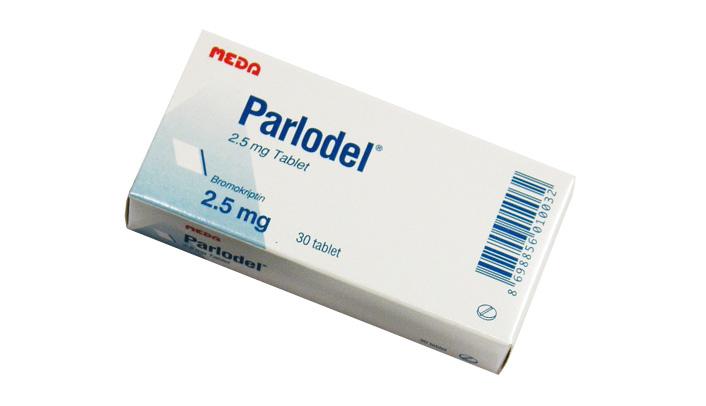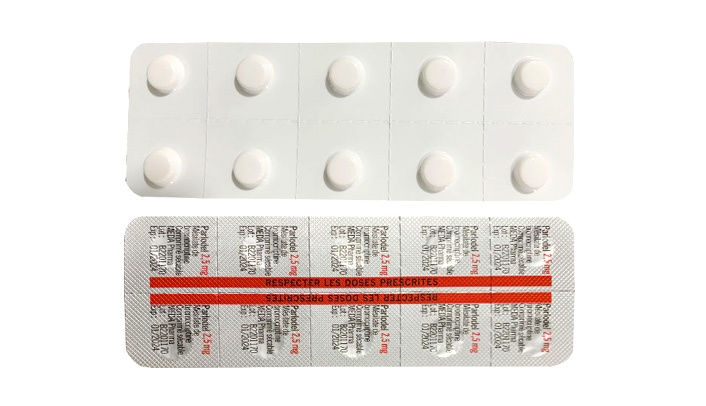Parlodel
Parlodel is commonly known as bromocriptine. It is a dopamine agonist. This medicine works by interrupting the pituitary gland secretion of prolactin. It also reduces the levels of growth hormones in acromegalic patients. In the Parkinson disease, this drug works by raising the action of dopamine receptors in some parts of brain.

Uses
Parlodel is used to treat Parkinson disease, acromegaly and some other medical conditions such as abnormal or excessive production of breast milk or other menstrual disorders caused by hyperprolactinemia-high levels of prolactin in blood. It may also be utilized for the treatment of some tumors that produce lots of prolactin.
How To Use
The drug is administered with meals. To suppress excessive milk secretion in galactorrhoea, as well as in dysmenorrhoea and infertility prescribe 0.5-1 tablet 2-3 times a day. Treatment is continued until complete cessation of milk secretion, normalisation of the menstrual cycle. Usually the course of treatment is 3-4 weeks. In acromegaly begin treatment with 1 tablet a day, gradually the doctor increases the dose during 1-2 weeks to 4 tablets per day. In Parkinson's disease use 4-6 tablets a day in 4 doses. In Icenko Cushing's disease, 3 tablets are prescribed on the first day, then the dose is reduced to 2-1 tablets. After 2-3 weeks of such treatment prescribe 1 tablet once a day. The course of treatment is 6-8 weeks.
Side Effects
The most common side effects which are caused by this drug are stated below:
- Diarrhea
- Cold sensitivity in toes and fingers
- Dizziness
- Constipation
- Drowsiness
- Fatigue
- Dry mouth
- Indigestion
- Headache
- Nausea
- Light-headedness
- Stomach cramps
- Vomiting
- Loss of appetite
Get immediate medical aid if any of these adverse side effects are observed:
- Severe hypersensitivity such as difficulty breathing, swollen lips/face/tongue/mouth, tightness in chest, hives and skin rashes.
- Unusual involuntary movements
- Bloody or tarry stools
- Back pain
- Confusion
- Chest pain
- Changes in sexual desire or ability
- Decreased urine
- Fainting
- Depression
- One-sided numbness
- Weakness
- Hallucinations
- Nasal discharge
- Seizures
- Persistent dizziness
- Headache
- Shortness of breath
- Trouble speaking
- Slurred speech
- Severe loss of coordination
- Swollen legs/ankles/feet
- Daytime sleepiness
- Abnormal skin growths
- Vision disturbances
- Vomiting
- Stomach pain
- Ringing in the ears
- Blurred vision
Contraindications
Before using Parlodel, tell your doctor if you have any of the following conditions:
- If you are hypersensitive to food or medicine.
- If you have a unique hereditary problem of severe lactase deficiency, malabsorption of glucose-galactose or galactose intolerance.
- If you are using any prescribed, non-prescription medicines or herbal supplements.
- If you have a history of kidney or liver disease, cardiac problems, high or low blood pressures, lung disorders, stroke, blood vessel disorder, breathing problems, bowel bleeding, stomach ulcers, dementia, seizures, melanoma, sleep problems, vision disturbances, neuroleptic malignant syndrome or sleep problems.
Pregnancy And Parlodel
In patients who wish to become pregnant, Parlodel, like all other medicinal products, should be discontinued after confirmation of pregnancy, unless there are medical indications for continuing therapy. Discontinuation of Parlodel during pregnancy did not increase the incidence of spontaneous abortion. Extensive experience shows that the use of Parlodel during pregnancy does not adversely affect its course or outcome.
Interactions
Concomitant administration of Erythromycin or other macrolide antibiotics or octreotide may increase the concentration of bromocriptine in plasma.
Drug Images

Bromocriptine
Bromocriptine is a medication primarily used to treat various medical conditions, including Parkinson's disease, acromegaly (a condition involving excessive growth hormone production), and certain types of infertility in women due to high levels of prolactin hormone. It belongs to a class of medications called dopamine agonists.
By mimicking the action of dopamine, bromocriptine helps to restore the balance of certain neurotransmitters in the brain, particularly dopamine, which is involved in regulating movement, emotions, and hormone levels.
Prolactin
Prolactin is a hormone produced by the pituitary gland, a small gland at the base of the brain. It plays a crucial role in various bodily functions, particularly in women's reproductive health and lactation.



